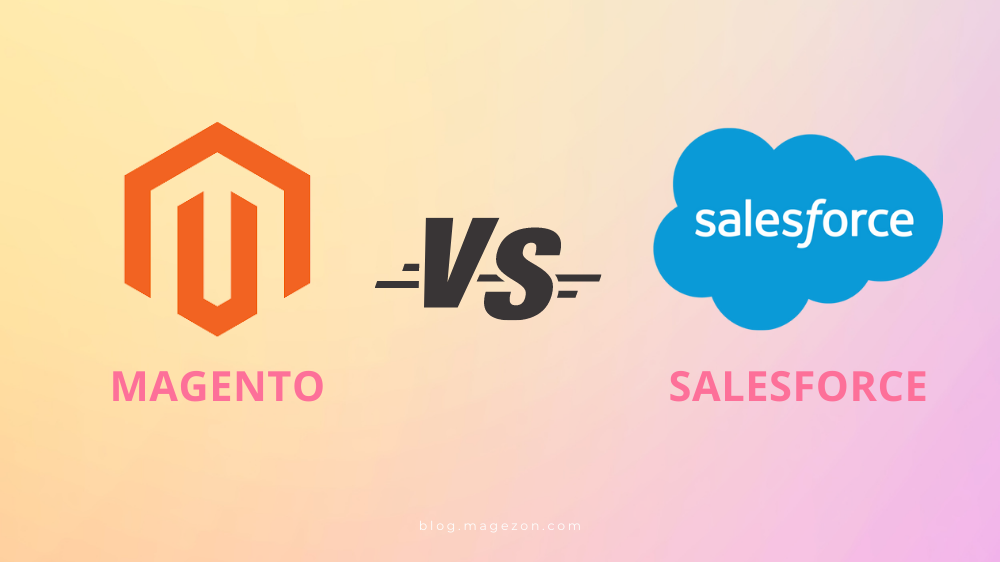
If you’re looking to get an eCommerce solution up and running, you might have heard of Magento and Salesforce. Both are top-of-the-line eCommerce solutions, but the question that will ultimately drive your decision is: What’s better, Magento vs Salesforce? To help you make this decision, we’ve put together this comparison to take a look at the pros and cons of each platform. Check it out to get all the information you need to determine which will work best for your business! Let’s get started!
Table of contents
A brief overview of Magento and Salesforce
Before diving into the detailed comparison between Salesforce vs Magento, let’s have a look at Magento and Salesforce basic knowledge.
Magento
Magento is an eCommerce platform that is open-source and formulated on Zend Framework. In 2007, it was developed by Varien Inc. and finally released in March 2008. Over time, Magento has made a name for itself as one of the most powerful eCommerce solutions available on today’s market.
It has been trusted by countless world-famous businesses, including but not limited to Helly Hansen, Nestle, Ford, Forever New, Moschino, ASUS, Land Rover, Aldo. As of 2021, over 750,000 online shops have been constructed using this platform, and indeed, this number is increasing significantly.

| Read more: Salesforce CRM Platform: An Ultimate Guide Major Benefits of Magento Salesforce Integration Why keeping Magento Commerce updated can lower TCO significantly? |
Salesforce
Salesforce is a platform-as-a-service (PaaS) company with headquarters in San Francisco, California. The company was founded in 1999 and offers a customer relationship management (CRM) system and other enterprise solutions such as analytics, marketing automation, etc.
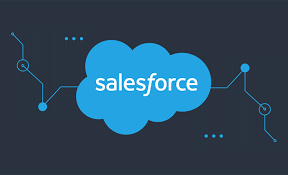
Today, it has grown into one of the most popular and sought-after enterprise cloud solutions on the market. Because of its popularity, over 150,000 companies have used Salesforce as an all-in-one platform to run their business.
Magento vs Salesforce Comparison
Magento vs Salesforce similarities
As both are widely-used platforms, there are many aspects to consider when it comes to similarities between Magento vs Salesforce.
Firstly, looking at the purpose of the introduction of Magento vs Salesforce, we can see that they are sophisticated software that aims to support businesses to maximize revenue in the online context by utilizing modern technology.
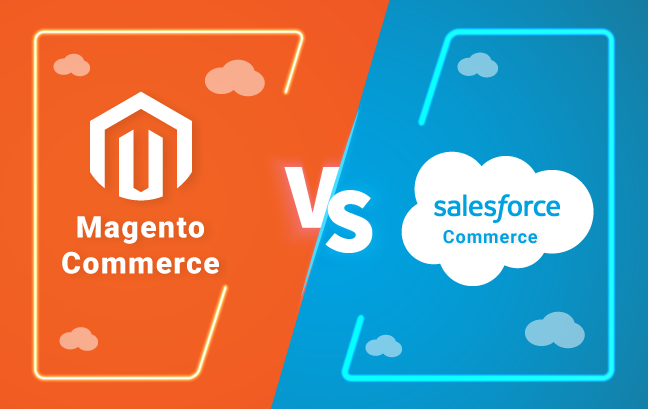
As you may know, the more users appear on the Internet, the more information can be received.
With businesses, these inputs play an essential role in gaining customers’ insight, which benefits the companies. Therefore, companies desire to utilize these significant data sources, and Salesforce vs Magento appears to be the solution.
Besides, by using the specific analyzing techniques, Salesforce vs Magento can assist organizations in reaching a far greater degree of professionalism and efficacy when dealing with online consumers. They provide training and bespoke quotations and have received great acclaim from the many sectors that use them. Furthermore, because they are innovative, many reputable brands have chosen them to develop their stores on both platforms.
Magento vs Salesforce differences
Although Salesforce and Magento are both broadly well-known for their robust functionalities, which assist online merchants in setting up eCommerce stores effectively, they have several differences.
1. Key Features and Functionalities
The first aspect that differs from Salesforce Commerce cloud vs Magento would be their key features and functionalities.
If you experience Magento, you will realize that Magento is a potent tool in its niche. It provides necessary and far-beyond-expected support that is suitable for a wide range of products and services and customized to fit unique characteristics. Below are some outstanding features of Magento:
- Essential but vital native product kinds: Magento offers various functions based on simplicity, configuration, downloadable features, etc., to improve customers’ experience on online platforms.
- Customization of product kinds: If you want to equip several special functions to your platform like subscription bundles, Magento also makes it available for you. However, remember that the more positions you add, the higher charge you have to pay. Therefore, carefully considering your situation and nature of products or services before implementing any further additions would be wiser.
- Customer segmentation: As you may know, customers are different, leading to various beliefs, demands, values, etc. Therefore, performing one display to all groups of customers would not be recommended. With Magento, you can solve this problem quickly to illustrate various shows to segments of users.
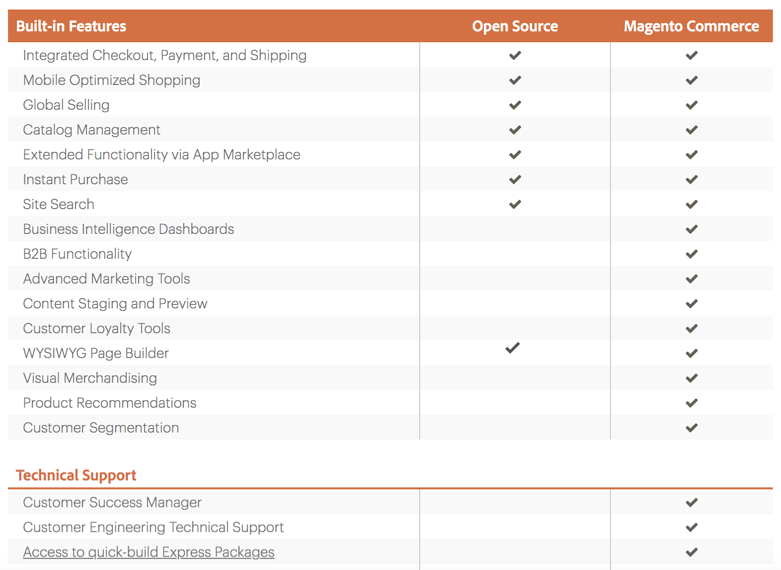
On the other hand, Magento’s rival, the Salesforce CRM platform, is superior to additional features, especially fashion and lifestyle space. Several remarkable points would be as follows:
- Support provision for complicated product categories: In the fashion industry, as there are various available offers in terms of clothes, shoes, and so on, customers would tend to search for products providing some required features. If your platform can not promptly display relevant products, website users will leave immediately and hardly give you a second chance. Facing this situation, you can utilize a salesforce e-commerce solution to create different and specific categories.
- Task scheduling ability: With Salesforce, you can easily schedule the publication of new products, discounts, programs, etc.
2. SEO & Marketing
Another remarkable aspect to consider when discovering Magento vs Salesforce would be the ability to foster SEO & marketing for businesses.

As you may know, one of the most important features that attract and retain online users is content. In other words, the content provided must be relevant, specific, and appealing to stimulate customers to choose products. Unfortunately, many entrepreneurs fail to convince customers to purchase since they provide inadequate information that fascinates themselves, not the customers.
So how to overcome this problem if you are a newbie with little or no experience in the field? Magento realizes this need, and recently, it has integrated the Page Builder. Simply speaking, a page builder is a drag-and-drop tool that allows you to create, update CMS pages, static and dynamic blocks to enhance the platform’s content management capabilities.
Now let’s look at the competitor, Salesforce. In case you have searched for many Salesforce reviews, you would notice that content is the major weakness of this software. In the past, it lacked the built-in capability for organizing and maintaining content-rich pages; thus, shop owners who required such skills had to rely on extensions.
3. Pricing
From Magento review, when choosing this software, you can have two options: Magento Open Source and Magento Commerce. The significant difference between them would be the first one is a free version while you have to pay a considerable amount to utilize the later.
As pricing is the central problem, let’s analyze the second type. Usually, you will have to pay at least $22000 a year for starting a platform with under $1 million gross revenue. Later, the more expansion your platforms require (with favorable customers), the higher charge you have to pay to achieve additional suitable features. For example, to experience website build or development services, you may cost $150 to $1 million.
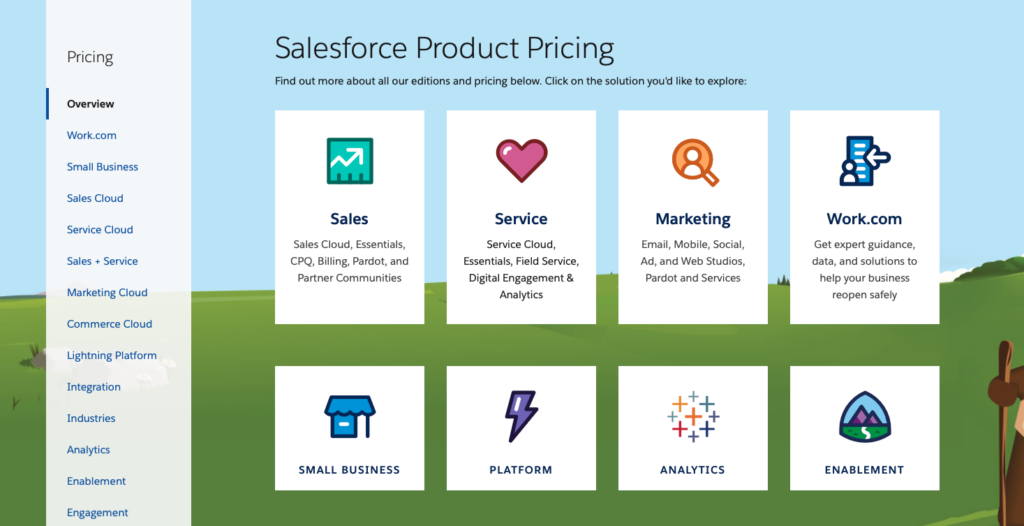
On the other hand, when taking Salesforce to compare Magento, Salesforce has traditionally been the considerably more expensive alternative. However, there is no specific answer for the question “How much does Salesforce cost?” since this software applies a unique pricing technique that changes according to quote, size of the enterprise, and its tune over.
To be specific, each business is a unique case and will be cost accordingly. Nevertheless, you can refer to the number from the Salesforce review. Generally, a retailer earning $20 million will pay Salesforce from $300000 to $750000.
Click here to see detailed Salesforce product pricing.
4. Scalability
Comparing Magento vs Salesforce commerce cloud in terms of scalability, many experienced states that Salesforce is by far superior to Magento 2. However, it is not precisely the case. According to professionals, the underlying reason for uncomfortable feelings with Magento 2 is that it is new, and some issues appear.
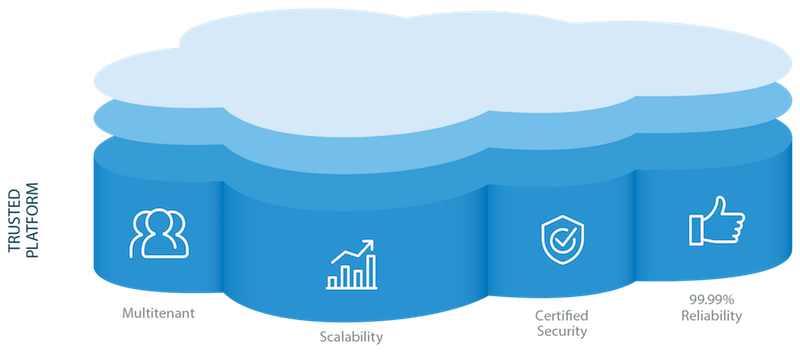
As a “giant” in this niche, Magento realized this weakness and made tremendous efforts to overcome it. Recently, thanks to various developments, more and more companies have selected Magento satisfied with its scalability. So, even if your company is still in its early stages, you can be confident that Magento will be able to scale with you regardless of changing demands, climbing traffic, and the growth of complexity of your whole eCommerce ecosystem.
As a result, having a competent eCommerce partner on your side who can advise you on how to optimize your processes and work with you to develop your online shop is beneficial.
5. Speed & Performance
As a rule of thumb, in the online context, nothing is more important than the website’s speed. According to Google research, a delay of 0.4 to 0.9 seconds, which generally people perceive as a tiny and harmless period, can force the page traffic to decline by 20%. A similar result is also reported in Amazon, with a 1% sales decrease for every 100 milliseconds growth.
There is no specific answer for the concern of who is the winner among Magento vs Salesforce in the speed and performance competition. However, one surely would be although both experience low speed sometimes, Salesforce software is more sensitive and likely to slow since it is affected by various factors.
In the case of Magento, it is not the Magento itself that causes the page to load poorly. The majority of poor interface and excessive loading time difficulties are caused by negligence as well as a lack of understanding of website optimization. Suppose you do not satisfy the fundamental requirements for running a Magento shop, such as installing unsuitable extensions or not enabling the required plugins. In that case, your business’s speed will undoubtedly slow down.
On the other hand, Salesforce speed seems to be worsened by numerous factors as illustrated below:
- Low-quality bandwidth: Normal false actions that most firms conduct when having low-speed websites would be implementing more bandwidth. However, it is not the case. Asking IT engineers to switch high-quality bandwidth would be a better solution.
- Impact of recreational traffic: Too many devices connecting to the company wireless network can remarkably reduce Salesforce speed. You should set up a separate wireless network for all devices except one using for Salesforce platform.
- Intelligent caching: To provide a rich user experience, Salesforce contains JavaScript and CSS files that take time to download. A single page utilized by your sales team may contain several plugins and be 5 MB in size. Because this is a typical case, you may activate network caching and produce a cached variant that is kept locally.
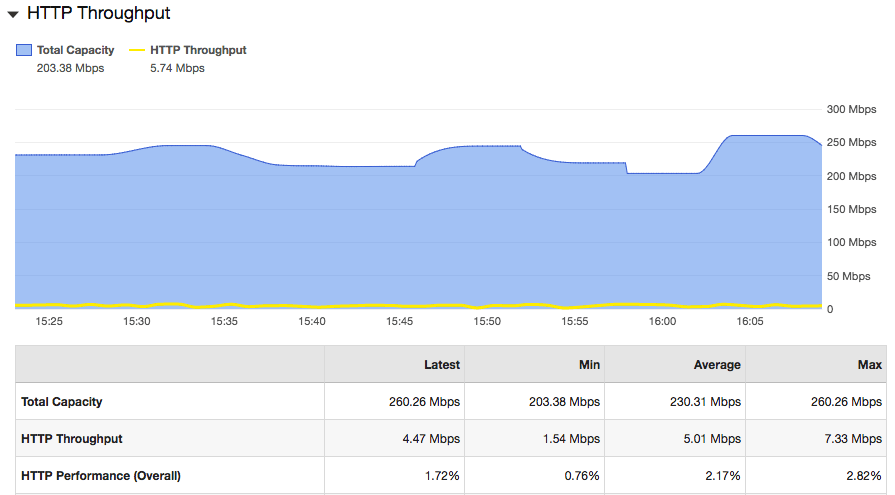
- Technical debt: This undesirable challenge is created by improper use of fertile fields, workflows, Apex Code, and so on. Technical debt is the most challenging problem to deal with, and you may consult Salesforce developers to improve the circumstance.
- Plugin usage: Salesforce customers have a plethora of plugins available, each of which can enhance or degrade the overall end-user experience. The majority of transferring data is handled by third-party plugins, which customers utilize for lead generation, sales, marketing, and accounting. As a result, you must evaluate how much bandwidth your plugins consume. Excessive plugins can consume a significant amount of bandwidth and may begin to impact the speed of your Salesforce Lightning.
4. Security
Since its introduction, Salesforce has gained a remarkable reputation for its secure ability that benefits from the robust, safe Salesforce cloud environment. According to its developers, no issues with PCI compliance have been witnessed and recorded with Salesforce.
On the other hand, Magento Commerce is also highly secure because it is hosted and controlled by Adobe, one of the most reliable organizations. In other words, you can experience the world-class security data of your company and beloved customers. Besides, you can also utilize Magento and Adobe’s PCI compliance certificates to streamline the process of ensuring PCI compliance in your own eCommerce business.

5. Easy to Use
Considering Magento vs Salesforce commerce cloud in terms of how easily one can get used to it, Salesforce would be the winner.
When searching for the top reasons why you choose Salesforce, you will notice that its usability ranks top in customer perception. With Salesforce, selling agents can logically display their accounts, contacts, tasks, and so on. Besides, this software also offers a 360-degree view of customers, providing businesses with the most accurate and detailed insights of customers, which supports them in delivering a better experience. Furthermore, it is simple to switch between modules, and you can even collaborate with your peers.

Contrary to Salesforce, Magento is well-known for its difficulties in learning and using it. For people with fairly slow experience in developing their own website, there is little chance to utilize it. It’s a bit difficult to tell if you’ll find the UI user-friendly, and a lot of this has to do with the fact that they’re starting to promote both Magento versions to smaller business owners.
6. Support
Because most businesses are not expertized with Salesforce vs Magento, it is very likely that unexpected circumstances such as quick breakdown, critical bugs, and so on happen while they use this software. Hence, the support plan should be seriously taken into consideration to determine which is superior among Magento vs Salesforce.
Remember that Magento only offers on-demand or application support for the Commerce edition. Therefore, as a shop owner, you have the option of accepting these agreements or seeking expert assistance from a Magento firm.
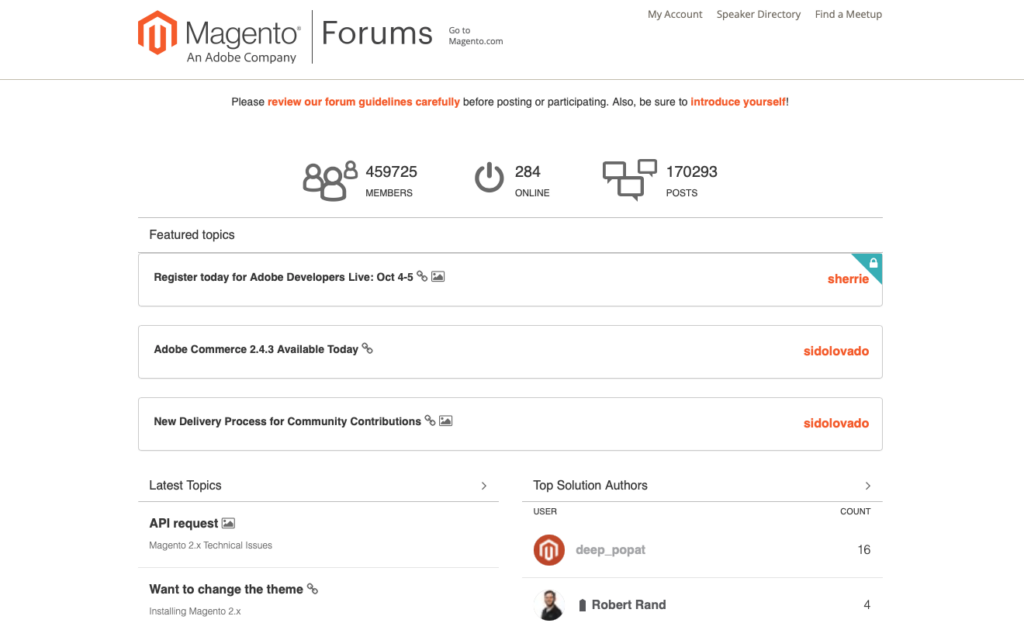
Contrary to Magento, Salesforce provides a support plan with a higher level of reliability and comprehensiveness, including 24/7 support, load balancing, assistance during sales peaks, and so on. However, more comfortable support means higher fees you will have to pay for Salesforce’s services.
9. Extensions and Plugins
Moving to the aspect of extension, Magento vs Salesforce have both similarities and differences.
According to professionals, both systems distinguish themselves among rivals available on online retail by providing extensive developer documentation and APIs. Secondly, if you lack the necessary development knowledge to make changes programmatically or lack time and resources, you may always visit the Magento and Salesforce official platforms.
Here, you can discover various native and third-party extensions, both free and commercial, which match any capability that your shop is in short. In addition, both marketplaces thoroughly evaluate the source code of each submitted extension before listing it for sale on their respective platforms.
However, when looking deeply at Magento vs Salesforce, its extensions are more comprehensive because various brands and organizations widely use Magento. Consequently, the costs of extensions and designs of Magento are lower than Salesforce and also below the market average.
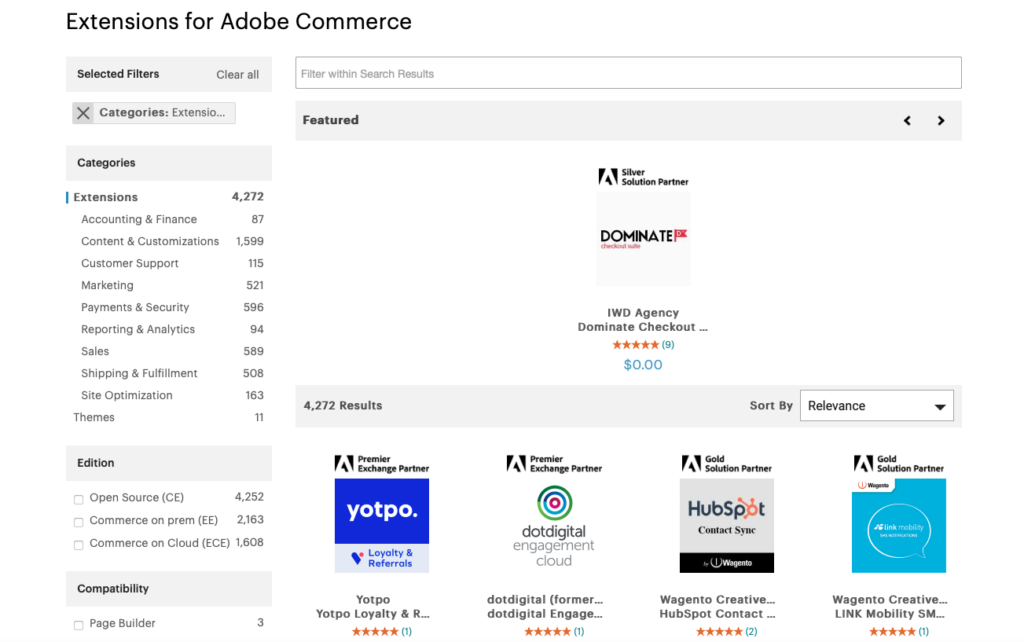
As many users say, there is no limitation for the quantity and variety of Magento extensions in the Magento marketplace. Orders, checkout, shipping, buttons, marketing, integration, reports, navigation, search, reviews, and other features may all be extended. Take the extensions provided by Magezon, for example, you can find various types like:
- Mega Menu: This extension helps you to create mega menus with SEO friendly and intuitive interface.
- Landing Page: Magento 2 landing pages extension allows you to build high converting pages with no coding skills.
- Out Of Stock Notification: This Magento’s extension is a robust tool that assists online merchants to update customers about their favorite items through emails.
10. Brands using Magento vs Salesforce
Being the top software for e-commerce platforms providing tremendous functions, tools, and so on that not only satisfy websites’ customers but also support brands to analyze data, it is no doubt that Magento and Salesforce can earn a great number of companies. However, there is a considerable gap between users of the two software. According to information collected and officially published, while Salesforce Commerce Cloud can attract only 4,076 users, Magento is trusted by over 250,000 e-commerce sites globally.
There are various brands that utilize Magento tools, including but not limited to Ford, Asus, Helly Hanson, Olympus. On the other hand, Salesforce Commerce Cloud is also believed by brands regardless of industries as follows: L’Oreal, GAP, Lacoste, New Balance
Magento vs Salesforce: Which one is better?
Considering all the aforementioned factors, there is no specific, one-fits-all answer for this concern. Instead, you should take into account various factors referring to your circumstances to select the best choice.
Firstly, if you are relatively low-skill in the field of developing customized platforms, Salesforce Commerce Cloud would be the ultimate option. On the other hand, some organizations with advanced expertise may prefer software that allows freedom and customization, skipping Salesforce to choose Magento as Salesforce does not support you with the case.
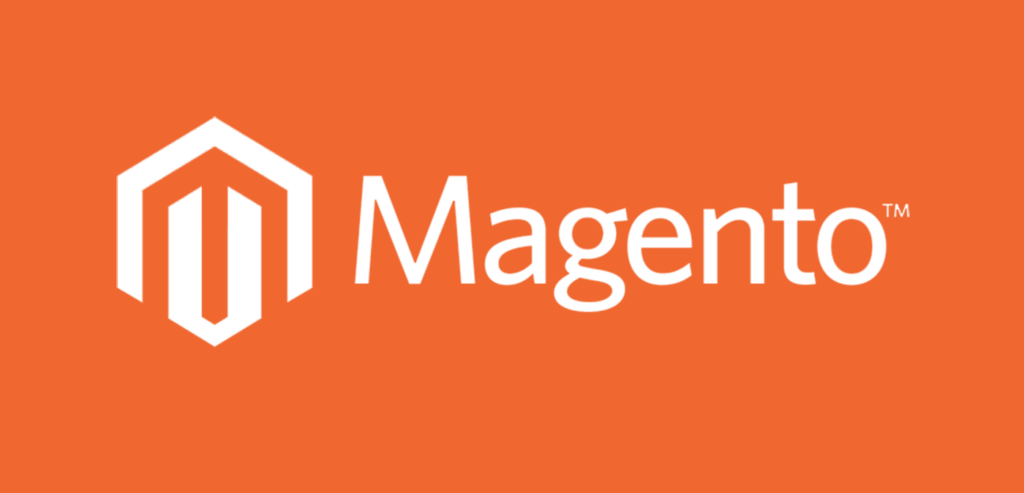
Secondly, small businesses with a tight budget, or low financial ability, as you might say, should prioritize Magento Open Source as it’s free, or Magento Commerce because it is more economical, and you only pay a previously announced fixed fee. However, coming to the level of the giant enterprise, more cost would be incurred due to maintenance, upgrades, etc. With Salesforce, the more you can earn from selling products, you have to pay for this software.
Thirdly, Salesforce Commerce Cloud is the more established B2C solution at the corporate level, with more extraordinary native features. Therefore, Salesforce Commerce Cloud is a fantastic solution if you’re searching for a trustworthy enterprise SaaS platform. But if you’re a B2B merchant with sophisticated requirements or don’t want to invest a lot of money in the platform, Magento would be a superior choice.

Remember that the three above points mentioned stress that you should refer to many aspects to determine which software to utilize. Software should be suitable to your desires, demands, and objectives previously set by the companies.
Wrapping Up
With so many eCommerce platforms to choose from, it can be tough to know which one to use when starting your own business. Magento has long been an industry leader when it comes to flexibility and robust features. Still, Salesforce has recently made inroads in the industry by being much more user-friendly and catering to new online businesses. Hopefully, after reading this blog, you can compare Magento vs Salesforce and make an informed decision.

Optimize Your Magento Store With Powerful Extensions
Looking for fast, efficient and well-coded extensions to build or optimize your Magento stores for sales boosting? Then visit Magezon website and grab necessary add-ons for yours today!
 Magezon Blog Help Merchants Build Comprehensive eCommerce Websites
Magezon Blog Help Merchants Build Comprehensive eCommerce Websites

